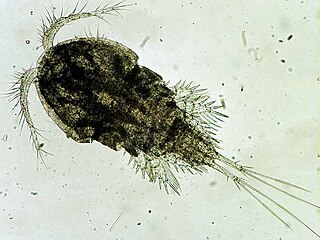
Cyclops is one of the most common genera of freshwater copepods, comprising over 400 species. Together with other similar-sized non-copepod fresh-water crustaceans, especially cladocera, they are commonly called water fleas. The name Cyclops comes from the Cyclops of Greek mythology, as they have a single large eye; in Cyclops, the eye may be either red or black.

Diaptomus is a genus of copepods with a single eye spot. It is superficially similar in size and appearance to Cyclops. However it has characteristically very long first antennae that exceed the body length. In addition, the females carry the eggs in a single sac rather than the twin sacs seen in Cyclops. It is a copepod of larger freshwater ponds, lakes and still waters.
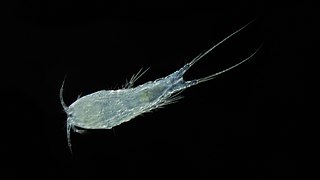
Canthocamptus is a genus of copepods that live in freshwater of Holarctic. There are 21 different species of Canthocamptus.
Acanthocyclops is a genus of copepod crustaceans in the family Cyclopidae. It was originally described by Friedrich Kiefer as a subgenus of Cyclops, and contains the following species:
Afrocyclops is a genus of copepod crustaceans in the family Cyclopidae, containing the following species:
Arctodiaptomus is a genus of copepods in the family Diaptomidae.
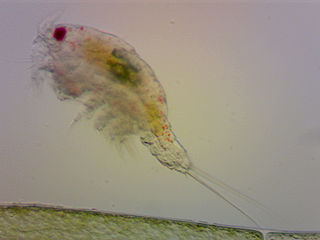
Attheyella is a genus of copepods in the family Canthocamptidae, containing the following species:
Elaphoidella is a genus of freshwater copepods in the family Canthocamptidae. It contains over 200 species, including three classified as vulnerable species by the IUCN – three endemic to Slovenia and one endemic to the United States. In total, the genus Elaphoidella contains the following species:
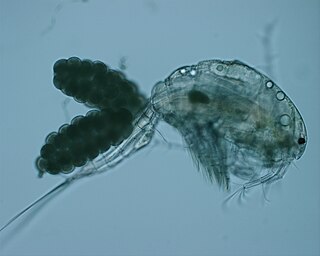
Mesocyclops is a genus of copepod crustaceans in the family Cyclopidae. Because the various species of Mesocyclops are known to prey on mosquito larvae, it is used as a nontoxic and inexpensive form of biological mosquito control.
Metacyclops is a genus of copepod crustaceans in the family Cyclopidae, containing 61 species, of which three are listed on the IUCN Red List – M. campestris from Brazil, M. gasparoi from Italy (vulnerable) and M. postojnae from Slovenia (vulnerable).
Nitocrella is a genus of copepod. Although most other genera in the family Ameiridae are marine, species of Nitocrella are almost exclusively found in subterranean fresh water or brackish water. More than 80 species are included in the genus, including two which are listed as vulnerable species on the IUCN Red List:

Thermocyclops is a genus of crustacean in family Cyclopidae. It was first described and later extensively researched by Friedrich Kiefer, who discovered some 20 species. The species and subspecies of the genus inhabit fresh and brackish waters alike all around the world, although most are from tropical areas.
Thermodiaptomus is a genus of copepods in the family Diaptomidae, containing the following species:
Tropocyclops is a genus of copepod crustaceans in the family Cyclopidae. It contains the following species:

Cyclopidae is a family of copepods containing more than half of the 1,200 species in the order Cyclopoida in over 70 genera.

Canthocamptidae is a family of copepods. Most of the 700 species are confined to fresh water, although there are also marine species. It contains the following genera:

Cyclops bicuspidatus is a planktonic species of copepod found throughout the world, except Australia, and characteristic of the Great Lakes of North America. It is a deep water species found throughout the year with peak abundance occurring in May or June. Males grow up to 0.8–1.0 millimetre (0.031–0.039 in) long, while females are larger at 0.9–1.6 mm (0.035–0.063 in).
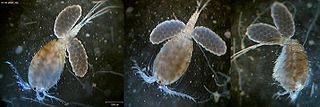
Macrocyclops is a genus of copepods belonging to the family Cyclopidae. There are currently 13 described species found in fresh water habitats throughout the world:
Microcyclops is a genus of copepods, containing the following species:









